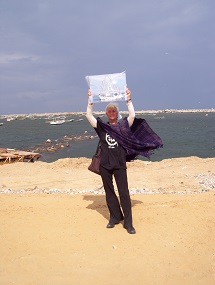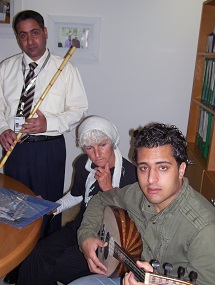Erster Teil: Irene
Ich schreibe dies in meiner schmutzigen Gefängniszelle. Keine Ahnung, was das für ein Gefängnis ist, wo es liegt. Givat wie bitte? Ich habe die Leute, die mich herbrachten, nicht noch einmal gefragt. Lo ichpat li – ist ja auch nicht wichtig. Wichtig ist, dass ich so bald wie möglich aufschreibe, was passiert ist, Bilder. Worte. Eindrücke, bevor sie mir aus dem Gedächtnis schwinden oder ungenau werden.
Ich sitze auf einem schmutzigen, kaputten Plastikstuhl und starre auf das Gitterfenster in der großen blauen Eisentür. Woher kommt dieser Krach? Schreib weiter, lass Dich nicht stören. Aber ich spüre noch immer das Schaukeln der Wellen und eine seltsame Müdigkeit. Leg Dich aufs Bett, ruh Dich einen Moment aus. Ausruhen und schreiben.
Ich suche nach den Zeilen, die ich in den letzten Stunden an Bord hingekritzelt habe.
Dienstagmorgen. Wir kommen in Gaza-Gewässer. Schlechte Neuigkeit: die Toilette funktioniert nicht mehr. Ich war seit gestern nicht mehr dort. Die Männer machen die Flaggen fest und hissen das Segel. Die Friedenswimpel! Wir müssen uns beeilen, sie kommen. „Sie kommen“ – das sind die letzten Worte im Tagebuch eines deutschen Widerstandskämpfers, bevor sie ihn zur Hinrichtung führten. Ich spüre, wir werden nicht sterben.
Ich fühlte mich ruhig und voll Vertrauen. Etwas aufgeregt schon, die Wimpel mussten schnell hoch.
Itamar schlägt vor, sie in Bündeln zu befestigen. Lillian und ich sind dagegen: Sie müssten einzeln gehisst werden. Glyn, Lillian und ich befestigen sie an den Tauen. Wir haben nicht genug Bindfaden, wie sollen wir die restlichen Fahnen festbinden? Wir suchen in allen Ecken, in unserem Gepäck nach Bindfaden, und wir finden welchen. Jetzt flattern sie alle, alle 42 Wimpel mit 84 Tauben und mehr als 100 Namen von Menschen, die gerne mit uns gefahren wären. Das Bild sieht wunderschön aus. Ein alter, verbrauchter Kahn wie eine bunte Blume im ruhigen blauen Meer. Vish und Eli fahren im Rettungsboot um das Schiff herum und machen Fotos. Alle sind fasziniert.
9.30 Uhr. Am nördlichen Horizont erscheint ein israelisches Marineschiff. Wir ziehen die Schwimmwesten an und setzen uns auf das Achterdeck, jeder mit seinem Gepäck und einer Flasche Wasser. Die beiden Medienleute postieren sich rechts und links, um die Ereignisse zu dokumentieren, die auf uns zukommen. Ich sitze neben dem Maschinenraum. Glyn erklärt mir, wie ich den Motor abstellen muss, damit ich bereit bin, wenn er mich dazu auffordert.
10.00 Uhr. Ein zweites Boot in Sicht. Bewegt sich offenbar nicht. Wartet vielleicht auf uns.
10.30 Uhr. Lillian kommt vom verstopften Klo zurück. Nervosität schlägt auf die Blase. „Geh Du auch Pipi machen!“ Lilian spricht den hessischen Dialekt ihrer Eltern; sie musste Deutschland als Anderthalb-Jährige verlassen. Die Männer haben es leichter. Eine Hand fest in der Hand eines Anderen können sie das Gleichgewicht halten und über Bord pinkeln.
10.45 Uhr. Kriegsschiffe halten auf uns zu. „Acht Schiffe“, ruft jemand. Sie kommen rasch näher. Ich kann ihre Gesichter erkennen. Junge Gesichter, einige hübsch. Ich versuche, sie mir genau anzusehen. Um mich herum wächst die Unruhe. Reuven kommt zu mir herüber, um im Schatten zu sitzen. Die Sonne brennt auf der Seite, an der die Soldaten schnell näher kommen. Dort steht Itamar und redet mit ihnen. Er spricht die vorbereiteten Worte auf Hebräisch und Englisch. Ich höre ihn sagen. „Wir sind Friedensaktivisten.“ Reuven, der jetzt auf dem Dach des Maschinenraumes sitzt, schreit: „Ivrit, ivrit.“ Er versucht, mit den Soldaten zu reden. Er hat seine Gelassenheit verloren.
Ich sehe, dass Lillian unruhig wird, und bitte Yonatan, den Platz mit ihr zu tauschen, sodass sie zu meiner Linken sitzen kann. Wie besprochen, haken wir uns ein. Bei Reuven hake ich mich nicht ein, weil er Mundharmonika spielen will. Ich bin nicht sicher, dass er es schafft. Seine verletzte Seele kann bloß noch schreien. „Keiner hört ihm zu“, sagt Lillian.
Auf Itamar haben sie auch nicht gehört. Die Soldaten handelten wie Roboter. Offenbar waren sie nicht in der Lage, zuzuhören. Shema Israel. Höre Israel.
Yonatan macht Reuven Zeichen, die Mundharmonika zu spielen. Aber mir ist klar, dass Reuven dazu nicht mehr in der Lage ist. Also fange ich an zu singen. „We shall overcome.“ Und Yonatan, Lillian und andere fallen ein. Wir kommen bis zu zweiten Strophe: „Wir haben keine Angst, wir haben keine Angst.“
Es gibt ein wunderschönes hebräisches Lied. „Die ganze Welt, die ganze Welt ist nur eine schmale Brücke, und die Hauptsache ist, ha-ikar, lo l-fached, dass man keine Angst hat.“
Lillian schreit: „Seht, was sie mit dem armen Glyn machen.“
Lillian wollte ihren Augen nicht trauen. „Es ist nur ein Traum, ein böser Traum, es geschieht nicht wirklich“, sagte sie mir später, als wir im Polizeiauto saßen.
Sie stoßen Glyn grob vom Steuerrad auf Deck in die Kabine. Von da, wo ich sitze, kann ich nicht sehen, was mit ihm geschieht.
Während ich versuchte, Reuven zu beruhigen, beobachtete ich etwas Unglaubliches. Ich sehe Itamar gekrümmt auf dem Deck des nächsten Militärbootes liegen. „In Handschellen“, sollte ich schreiben – aber das Bild vor meinen Augen war „dos kelbl oifn furl“. Itamar war „gebundn mit a shtrik“.
Und ich sah etwas noch Grausameres. Plötzlich höre ich einen durchdringenden Schrei und sehe Yonatan auf dem Boden mir gegenüber sich winden vor Schmerzen. Was geht hier vor?
Das war völlig unbegreiflich. Später, als die Atmosphäre sich beruhigte, fragte ich Rami, und er erklärte mir, Yonatan habe Elektroschocks bekommen. Ich wusste nicht einmal, dass es solche makabren Dinge bei der Armee gibt.
Reuven blickt verstört auf seine Mundharmonikas, die vor ihm auf dem Boden liegen, zwischen schweren Militärstiefeln. Er kann nicht mehr sitzen bleiben, er muss aufstehen. Ich kann ihn nicht zurückhalten. Ich habe Angst, seine Emotionen könnten die Atmosphäre aufladen und Gewalt entfachen. Deshalb wende ich mich an den Soldaten, der neben ihm steht. „Er ist nervös, er ist Überlebender der Schoah.“
Naive, törichte Worte vielleicht. Aber sie schafften es, die Atmosphäre zu verändern. Der hilflos aussehende junge Soldat nickt. Unsere Blicke treffen sich. Ein Hauch von Verständigung außerhalb der Zeit.
Reuven sammelt die verstreuten Mundharmonikas in eine Plastiktüte. Er setzt sich neben Rami und wird bald ruhiger. Rami und ich wechseln erleichterte Blicke. Rami, ein ruhiger Mensch mit einem stabilen Körper, hat eine beruhigende Wirkung auf uns alle.
Ein anderer Soldat fragt mich: „Möchten Sie nicht lieber drinnen sitzen?“ „Nein“, antworte ich. „Ich muss aufpassen, was hier vorgeht. Ich muss Euch ins Gesicht sehen, damit ich mir sicher bin, dass Ihr menschliche Wesen seid. Ist es nicht verrückt, dass wir uns voreinander fürchten?“ Der Soldat, auch dieser, nickt. (habe ich ein „Ja“ gehört?) Und ich sehe, wie sein starres Gesicht einen entspannteren Ausdruck annimmt.
Ich sehe mich auf dem Boot um und versuche, mir dieses unglaubliche Bild einzuprägen: Acht Militärboote, einige mit Kanonenkugeln, ungefähr sieben bis zehn Soldaten auf jedem Boot. Auf unserem Achterdeck drängen sich außer uns etwa sieben Soldaten (wo nur fünf Passagiere sitzen dürfen). In der Ferne ein mächtiges Kriegsschiff, um neun friedlichen Aktivisten Einhalt zu bieten. Was für ein Wahnsinn! Wenn die Leute in Deutschland, in der EU und in den Vereinigten Staaten nur wüssten, dass sie auch finanziell zu diesem Irrsinn beitragen! (Und zu viel schlimmeren Schandtaten!) Wo sind die wahren Freunde, die Israel – krank vom Holocaust und von Jahrhunderten des Leidens – bei der Hand nehmen, vor einen Spiegel führen und auffordern, die irrsinnig scheußliche, grausame Maske abzunehmen; die ihr helfen, Israel ha-jaffa zu sein? [1]
(Übersetzung aus dem Englischen) [1] ‚Israel du Schöne’ - nach einem bekannten israelischen Tanzlied: „Israel ha-jaffah“
|
Adam, Prof. Zach |
|
Adler, Dr. Benjamin |
|
Agnon, Prof. Amotz |
|
Aharoni, Prof. Ada |
|
Amareggi, Daniella |
|
Amitay, Dr. Yossi |
|
Auron, Prof. Yair |
|
Ayalon, Uri |
|
Barak, Prof. Yoram |
|
Bar Ephraim, Rabbi Reuven |
|
Barnavi, Prof. Elie |
|
Bar-Tal, Prof. Daniel |
|
Bartor, Dr. Assnat |
|
Barwasser, Karlheinz Akiba |
|
Bat Rahel, Frieda |
|
Ben-Amos, Prof. Avner |
|
Bendersky, Sally |
|
benedikt, linda |
|
Bentwich, Zvi |
|
Ben-Ze'ev, Dr Efrat |
|
Berger, Gedeon |
|
Berlowitz, Shelley |
|
Bethlehem, Dr. Louise |
|
Bilu, Prof. Yoram |
|
Blanc, Prof. David |
|
Bleiweiss, Celino |
|
Bollag, Guy |
|
Bonstein, Dr. Herbert Samuel |
|
Bornstein, Gabriel |
|
Boyarin, Prof. Daniel |
|
Brook, Dr. Dan |
|
Canin, Noel |
|
Carel, Dr. Cynthia |
|
Carmeli, Tair |
|
Chamberlain Regev, Zohar |
|
Chomsky, Prof. Dr. Noam |
|
Christoph-Wyler, Yvonne |
|
Cohen, Ran |
|
Confino, Prof. Alon |
|
Dahan, Dr. Michael |
|
Dahan, Iris |
|
DeKoven Ezrahi, Prof. Sidra |
|
Dreyfus, Prof. Tommy |
|
Ehrlich, Eva |
|
Elhanan, Rami |
|
Elior, Prof. Rachel |
|
Elsohn, Alex G. |
|
Erenfryd Küffer, Smadar |
|
Ettinger, Anders |
|
Feiler, Pnina |
|
Feldman, Jennie |
|
Fidel, Prof. Raya |
|
Filc, Prof. Dani |
|
Finkelstein, Caroline |
|
Finkelstein, Nathan |
|
Fischer, Heide |
|
Fisch, Prof. Menachem |
|
Frankenstein, Karen |
|
Frankenstein, Ruben |
|
Freund, Dr. Elizabeth |
|
Friedmann, Daniela |
|
Gal-Ed, Dr. Efrat |
|
Gamliel, Dr. Ophira |
|
Gans, Prof. Chaim |
|
Ganzfried, Ilana |
|
Gerling, Prof. Dan |
|
Gerson, Betty |
|
Gissis, Dr. Snait |
|
Godfrey-Goldstein, Angela |
|
Golany, Ofer |
|
Goldberg, Dr. Amos |
|
Goldschmidt, Matti |
|
Goldschmidt, Tamar |
|
Goldstein, Prof. Bluma |
|
Golomb, Prof. Harai |
|
Grosser, Prof. Dr. Alfred |
|
Gruschka, Ruth |
|
Guggenheim-Ami, Batja P. |
|
Guggenheim, Dr. Ralph |
|
Guggenheim, Gilgi |
|
Guggenheim, Hans Chanan |
|
HaCohen, Prof. Ruth |
|
Hammermann, Roni |
|
Harel, Prof. David |
|
Hauri, Eliza |
|
Hefets, Iris |
|
Hefets Martijn, Tally |
|
Hennessy, Roswitha |
|
Hermon, Shelley |
|
Hilkowitz, Andrew |
|
Houser, Dr. Tammy Amiel |
|
Jablonka, Prof. Eva |
|
Jacobson, Prof. Dan |
|
Joseph, Prof. Claude |
|
Kabalek, Dr. Kobi |
|
Kahanoff, Dr. Maya |
|
Kaniuk, Aya |
|
Kappeler, Dr. Sima |
|
Katzenstein-Leiterer, Dr. Kate P. |
|
Kaufmann Crain, Fitzgerald und Soshya |
|
Kaufmann, Dr. Theodor |
|
Kaynar, Prof. Gad |
|
Keller, Adam |
|
Kempin, Johannes |
|
Klein, Prof. Menachem |
|
Korczyn, Prof. Amos D. |
|
Küffer, Smadar Erenfryd |
|
Kuper, Richard |
|
Kupferberg, Maya und Eli |
|
Lerman, Dr. Hemdat |
|
lerner, rabbi michael |
|
Levy, Prof. René |
|
Liel, Dr. Alon |
|
Lindeen, Prof. Ellen |
|
Lindtberg, Susanne |
|
Litvak Hirsch, Dr. Tal |
|
Lubin, Dr. Orly |
|
Margalit, Dr. Meir |
|
Margulies, Prof. Dr. Hune |
|
Mendes-Flohr, Prof. Dr. Paul |
|
Michaelson, Prof. Daniel |
|
Mond, Prof. David |
|
Mugier, Eveline |
|
Mühlmann, Jeanette |
|
Munk, Dr. Yael |
|
Naor, Dr. Dorothy |
|
Naveh, Prof. Eyal |
|
Navon, Judy |
|
Netzer, Dr. Olek |
|
Orth, Prof. Gottfried |
|
Oz-Salzberger, Prof. Dr. Fania |
|
Picard, Prof. Dr. Jaques |
|
Pick, Dr. Nimrod |
|
Polishuk, Daniel |
|
Pollatschek, Hortense |
|
Pozniak, Margalith |
|
Rahav, Dr. Shakhar |
|
Raphael, Zeev |
|
Rappaport, Michel |
|
Raz, Mozzi |
|
Regev, Prof. Oded |
|
Rheinz, Dr. Hanna |
|
Richter, Michael |
|
Ritter, Ruth |
|
Rohrlich, Dr. Daniel |
|
Rokem, Prof. Freddie |
|
Rosenfeld, Georges |
|
Rosenfeld, Prof. Jona M. |
|
Rosengarten, Lillian |
|
Rosenzweig, Ursula |
|
Rudolf, Prof. Mary |
|
Sabar, Prof. Naama |
|
Sagee, Yaniv |
|
Sagy, Prof. Shifra |
|
Sandri, Félix |
|
Schocken, Prof. Hillel |
|
Secker, Glyn |
|
Sfard, Prof. Anna |
|
Shainskaya, Dr. Alla |
|
Shlaim, Prof. Avi |
|
Sigmon, Erica |
|
Simons, Prof. Jon |
|
Sobol, Joshua |
|
Soder, Nelly |
|
Soen, Prof. Dan |
|
Somer, Prof. Eli |
|
Sommerfeld, Lili |
|
Sommerfeld, Nirit |
|
Spiro, Eran |
|
spiro, gideon |
|
Spitzer, Judith |
|
Störzbach, Marianne |
|
Trilse-Finkelstein, Prof. Dr. Jochanan |
|
Tzfati, Prof. Dudy |
|
Ury, Tanya |
|
Waechter, Berenice |
|
Walter, Prof. Dr. Joachim |
|
Warshawsky, Rivka |
|
Weil-Goldstein, Jochi |
|
Wengrower, Dr. Hilda |
|
Werner-Arnold, Ursula |
|
Wiener-Barraud, Dr. Samuel |
|
Winter, Ada |
|
Winter, Dr. Peter |
|
Yishai, Prof. Yael |
|
Ziegele, Uri |
|
Zilversmidt, Beate |
|
Zimmermann, Prof. Moshe |
|
Zuckermann, Prof. Moshe |
|
Zweig, Lawrence |
Auf dem Landweg nach Gaza einzureisen ist mühsam, zeitweise unmöglich. Die folgenden Zeilen berichten von meinen misslungenen Versuchen und einem geglückten mit der italienischen Gruppe "Vik2gaza".
Erster Versuch: März 2009 mit dem englischen Konvoi "Viva Palästina". Der motorisierte Konvoi bricht Ende Februar von London auf und erreicht auf dem Weg entlang der afrikanischen Küste den Grenzort Rafah am 9. März. Mit Yvonne Ridley, Journalistin und Co-Organisatorin, mir bekannt durch die Freegaza-Überfahrt auf der Liberty, vereinbare ich, dass ich mich in Kairo anschließe. Der Konvoi hat einige Tage Verspätung, die ich in Al-Arish verbringe. Der Jubel ist riesig, als die lange Auto- und LKW-Schlange endlich eintrifft. Die Gaza-Freunde scheinen große Teile der Bevölkerung im Nordsinai hinter sich zu haben. Dem englischen Abgeordneten und Teilnehmenden an der langen Reise, George Galloway, gelingt es, die Einreisegenehmigung für einen großen Teil des Konvois zu erhalten, d.h., für diejenigen mit britischem Pass. Ich gehöre nicht dazu.
Zweiter Versuch: im darauffolgenden Mai.
Ein Bericht zu dieser Reise findet sich auf der Website von Frieden in Israel und Palästina e.V.
Dritter Versuch: Dezember 2009 mit dem Gazafreedommarch
Zum Jahrestag israelischer Angriffe auf den Gazastreifen ("Operation Cast Lead") war ein Demonstrationsmarsch in Gaza, ein "Gaza-Freiheitsmarsch" mit Tausenden internationaler Menschenrechtsaktivisten geplant. Hauptverantwortlich war nach Rückzug des Ideenträgers Norman Finkelstein die US-amerikanische Menschenrechtsorganisation Code Pink - Women For Peace. Ich übernahm die Koordinierung für die deutsche Gruppe in der Vorbereitungszeit. Noch vor der Abreise war die Verweigerung der Einreiseerlaubnis durch die ägyptischen Behörden bekannt gegeben worden. Daher wurden diverse Demonstrationsveranstaltungen in Kairo durchgeführt. Am 31.12. fand ein symbolischer "Gazafreedommarch" der Teilnehmer auf dem Tahrir-Platz statt, der trotz des rigiden ägyptischen Demonstrationsverbots - dank der Erfindung von "flashmob"- gelang. Das ZDF berichtete und die taz veröffentlichte am 28.9. einen Bericht von Ivesa Lübben: "Beendet die Blockade von Gaza".
Vierter Versuch: Anfang 2011. Über die ägyptische Botschaft Berlin versuchen wir eine Importgenehmigung für die Sachspenden aus der Aktion "Jüdisches Boot" zu bekommen. Zunächst sieht es so aus, als würde unserem Gesuch stattgegeben. Ich werde zur ägyptischen Botschaft nach Berlin eingeladen, um Näheres zu besprechen. Die Spenden stehen alle für den Container nach Ägypten auf dem Seeweg bereit - aber die schriftliche Genehmigung bleibt aus. (Der größte Teil der Spenden erreicht später auf dem Postweg oder über Angehörige von Hilfsorganisationen Gaza)
|
Fünfter Versuch: Mai 2011. Den italienischen Freunden des in Gaza ermordeten Aktivisten Vittorio Ariigoni gelingt es, bei den ägyptischen Behörden eine Einreisegenehmigung für eine Memorial-Reise zu erhalten. Ich schließe mich der Gruppe an. Vittorio schaffte es immer wieder, trotz der Blockade, nach Gaza einzureisen. Er blieb während der israelischen Offensive "Gegossenes Blei" in Gaza und berichtete. Seine Erfahrungen hat er in dem Buch Gaza, Mensch Bleiben veröffentlicht (Verlag: Zambon). Die Deutsche Welle berichtete. In den letzten Monaten vor seiner Ermordung hat Vittorio vergeblich versucht, mir bei einer Einreise nach Gaza behilflich zu sein - sein Tod hat es mir ermöglicht. Mit dabei habe ich etliche Spenden, vor allem Musikinstrumente aus der Sammlung des "Das Jüdische Boot" - ja, und das Boot selber gelangt hinein, in Form einer Foto-Collage: |
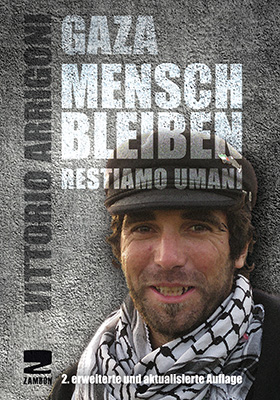 |
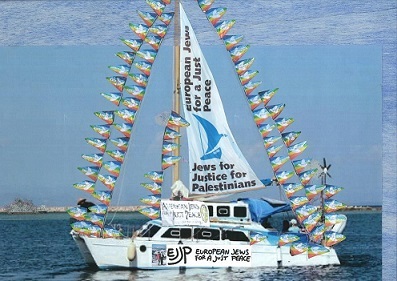 |
In der Collage flattert die Hälfte der Friedensfahnen gegen den Wind - sie waren beidseitig mit den Namen der symbolisch Mitsegelnden versehen. Alle sollten sichtbar sein (s. Tagebuch "Unterwegs nach Gaza"). Drei Bildcollagen wurden mit nach Gaza genommen. |
Stimmen aus Gaza zum "Jüdischen Boot"
|
|
- Dr. Eyad Al-Sarraj, GCMHP: Ich glaube, dass die symbolische Ankunft des Bootes der JfJfP und von Juden, die für Frieden arbeiten, ein wichtiger Schritt ist (...) Ich hoffe, dass eine tatsächliche Ankunft von Juden folgt, die sich für Frieden und Gerechtigkeit für Palästinenser einsetzen. - Nizar Ayash, Fischer-Gewerkschaft: "Wir danken euch sehr für die Absicht nach Gaza zu seglen. Wir wünschen uns sehr und hoffen, dass das nächste Jüdische Boot es schaffen wird, in Gaza anzukommen. Emad Naserallah, Gaza music school: Wenn man unter solch harten Bedingungen lebt, dann gibt es Momente der Verzweiflung und Hoffnungslosigkeit. Aber wenn ihr kommt, dann wissen wir, dass wir nicht alleine sind und wir fühlen uns stärker. |
|
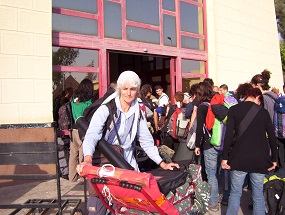 |
Bild links: mit italienischer Gruppe "Vik2Gaza" vor Rafah. Im Kinderwagen eine Oud (arabische Laute).Rechts: Das Boot Oliva von CPS, Civil Peace Service,Gaza. Das Boot soll fortan mit Freiwilligen der International Solidarity Movement (ISM) Gaza-Fischer begleiten und israelische Menschenrechtsverletzungen dokumentieren, bzw. zu verhindern versuchen. | 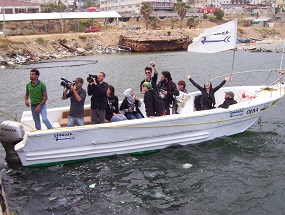 |
Peter Voß, ebenfalls Teilnehmer an dieser Aktion verfasste einen ausführlichen Bericht mit sehenswertem Bild- und Kartenmaterial auf seiner Seite Palästina - Israel.
"Versprich zu erzählen, was du gesehen hast". (In: Günter Schenk, Hrg., Denk ich an Palästina)
In front of me sit the little children in their black and white or red and white checkered scarves, which still struck us as hostile symbols. They wore them under the pressure of fashion. They knew nothing about the tradition of the keffiyeh. A Palestinian scarf? –Never heard of it. The fact that Arafat wore one and thus, it becoming a thing to wear …but who is Arafat? The story of his murder might sooner pique their interest. But I am not about to tell that story today.
My story starts at the time when everyone who wore a keffiyeh in the West was still regarded with suspicion. That time was after the Six Day War, the euphoric time when Israel was popular. Little David, badly weakened by the Holocaust, has just vanquished the mighty Arab Goliath. People empathized with the Israeli soldiers, who, after years of off-limits to them, again stood by the Wailing Wall. And one shared the happy and proud emotions of the Israeli people—the Jewish, obviously. Palestinians were at the time not yet part of the vocabulary. There were Arabs but weren’t they guilty of their own misfortune? And did they not intend to drive the Jews into the sea?
The realization that even witnesses of the time were incapable of looking in all directions simultaneously arrived a few years later, 1978, during the first Israeli invasion of Lebanon. The Israeli television of my host family showed cheering faces in Lebanon, the Israeli army, the liberators. A day later, the evening of my return to Germany, during the news of the day, the same events were shown---but with other pictures. Instead of euphoria there was force, frustration, revulsion. It all depends where the camera, the eye leads you.
Although my eyes had become sensitized, based on the awareness of a new perspective, they still saw only one side and focused on the Jewish-Israeli side of things and were totally unmindful of the Palestinian dimension. As compared to Israeli Jews, we had no hesitation about traveling through occupied areas with our old dilapidated Arab bus which looked more like a truck. We felt the embarrassment of the driver, the Arabian passengers, whenever the bus was stopped by the Israeli military, which happened often. That what was right was on our side, and in that frame of consciousness we traveled through Judaea and Samaria. A moral sense of injustice was limited to our all too brief mini-skirts, but that was all.
When our family became larger, our trips to Israel lessened. Only once did we as a family in 1980 take a trip. In the meantime I was studying Judaism at the university and attended seminars in language and history and concentrated on deepening relationships to Jewry and Israel. And yet, a distancing towards all this was transpiring in me. Something had become different. Dirt and garbage, pornographic pictures and offers to buy them “cheap”, anonymity and emptiness are typical of all large western cities. Here in Tel Aviv they appeared this year as futuristic signs and symbols, and enlarged the receptiveness for the warning texts of religious philosophers. Martin Buber deplored the loss of ethical values within the Zionist movement and urgently called for peace attempts to be initiated with the Arab population. Warning signs even emerged from the political perspective. Nahum Goldmann, former vice-chairman of the Jewish World Congress attempted to show how close Israel was edging to the abyss of disaster on account of its own moral disintegration in an article he penned in the weekly newspaper Die Zeit.*
I do not know why I cut out this article and saved it. In any case, it has survived for 26 years, and when the feeling overcame me that the named abyss had become intolerable, I re-read the article and quote from it. Had this abyss not arrived when the Israeli military declared bankruptcy in morality by the extreme fire and bombardment directed at the Gaza Strip and by the horrific bombing raids in Lebanon? “Unfortunately we punched in the wrong coordinates,” came by way of an excuse by the Israeli spokesman for the unfortunate bombardment at which eight women and ten children perished in the Gaza Strip. “In fact, Israel for a rather long time now has punched in the wrong coordinates. For years on end now the political leadership in the Palestinian conflict is intent on resolving it by force only,” is how an ARD radio announcer commented on this incident on the Tel Aviv radio.
But not nearly all German listeners agreed with that scenario. And many, who did agree did not have the courage to speak openly. They feared being stamped as anti-Semitic. Others, again, such people believed, that in light of the Holocaust experience, they were obligated to express uncritical solidarity with the State of Israel. One would have thought that criticisms from Jewish circles would have found easier access to public media and would have encouraged a reduction in the inhibition barriers of inhibition. Only Rolf Verleger, member of the Central Council, has managed to do so. In an open letter to the chairman of the Central Council he criticized the Israeli military measures against Lebanon and appealed for a peaceful solution for the Palestinian conflict. Many Jewish fellow citizens expressed solidarity with his position in writing. I sent him my commentary which I wrote during the Lebanese War and my contestation with the German attitude and involvement from afar. I wrote, “Just how badly is Israel protected?” This title is in reference to Heinrich Heine’s “Rabbi from Bacharach” which I sent to leading newspapers, which was published not at all but led to my losing friendships in my Jewish circle of friends and acquaintances. However, I was to gain new friends based on my contact with Rolf Verleger. He invited all those involved and who had assured him of their solidarity, after he had published my letter, to a meeting in Berlin. Together we formulated a position in which we demanded that the federal government (of Germany) follow the fundamentals of Humanism and People’s Rights regarding its Palestinian policies. As the first Jewish signers of a petitioning letter, we hoped to gather many signatures, which we named after the upcoming Jewish New Year’s Feast Shalom 5767 on which day we intended to submit our collection of signatures. The press showed little interest and so, in spite of some informational rallies, we managed to get only 13,000 signatures. The churches reacted controversially, apathy won the day. This unsuccessful effort was possibly partially our own fault. Twenty Jews (how many opinions does that amount to?) took too long in the formulation of the letter and the indignation regarding the Lebanese War had dissipated in large segments of the population.
During the preparations for our meeting and under the impression of daily news descending upon the scene, I realized how little attention I had paid to the Palestinian side or dimension of Israel. I had not visited the occupied areas for a long time and I had not visited the core country of Israel since 1997; explicitly I had visited Jerusalem (which also does not quite represent the core area). Here Heine’s birthday was celebrated, for the first time in Israel, and I wanted to participate in this celebration. The many successful events were all very well attended. Prominent representatives from the ranks of research, literary and politics were all there and together we sang Heine’s Song of Spring; birthday fever was in the air. However, it appeared to me that the birthday child himself would not have been all that elated about it all, possibly even angry, maybe even mad; or happy and mad simultaneously, since some of those Heine, the social critic, was close to, namely the Arabs from close proximity in Jerusalem, were not even invited. His poem “To Edom” was not read, nor recited. The final line “And I have become almost like you” has become more ingrained in me from day to day. Gaza, that monstrous open air prison had not yet been totally walled in, and still enjoyed a minimum amount of freedom. It was Heine’s aim and mission to assert freedom, freedom for all mankind and he knew that his Messiah wanted to save not only Israel “as the superstitious Jews presumptuously believed, but all of suffering mankind.”
Only after our meeting in Berlin did I visit parts of the occupied areas. I saw, heard, discussed and promised to return. I did return and I was allowed several times to avail myself of the wonderful Arabian hospitality and, as a Jewess, did not have to hide myself. I lived with enclosed Palestinians behind walls, and was a witness to their daily humiliations, their rationed water allotments and their disappointments. “You have to promise us that you will tell what you have seen.”
But who wants to hear it? I started a Study Group Abraham’s Daughters and maintain contacts with peace workers from both sides. In January of this year we supported an Israeli convoy which was to take essentials of life to the enclosed Gaza Strip. This mission failed. Initially! These essentials were stored for a week in a kibbutz for safekeeping; this kibbutz was located close to the border. It was my kibbutz, the one on which I stayed when I first came to visit Israel, and now I no longer knew where it lay, but in which the words flight and dispersal were anchored in my memory.
I still wear the chain with the Star of David which I bought at the Encounter Trip in an Arabian store right by the Jaffa Gate. “Is that a Jewish Star?” the students ask, those with and without the keffiyeh. No, this is not the Jewish star. God forbid!
* “Worries about Israel", Die Zeit, No. 29 – July 1, 1980
